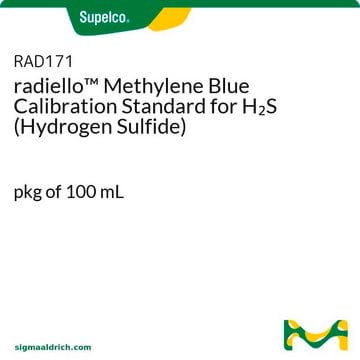RAD170S
radiello™ Passive Sampler Starter Kit
Hydrogen Sulfide
Synonym(s):
radiello™ Starter Kits
About This Item
Recommended Products
product name
radiello™ Hydrogen Sulfide Starter Kit,
Agency
NIOSH 6013
OSHA 1008
Quality Level
packaging
pkg of 1 kit
manufacturer/tradename
Radiello
technique(s)
passive air sampling: suitable
matrix
microporous PE coated with zinc acetate
application(s)
air monitoring
environmental
industrial hygiene
compatibility
for sampling Hydrogen sulfide
Looking for similar products? Visit Product Comparison Guide
General description
Each RAD130S Starter Kit Includes:
Two radiello cartridge adsorbents - Solvent Desorption Note: 1 x cartridge for sampling; and 1 x for blank)
1 x Triangular support plate (RAD121)
1 x vertical adapter for personal sampling (RAD122)
1 x white diffusive body (RAD120)
1 x barcode label (RAD190)
Detailed sampling/analysis instructions
Each RAD141S and 145S Starter Kit Includes:
Two radiello cartridge adsorbents - Thermal Desorption (Note: 1 x cartridge for sampling; and 1 x for blank)
1 x Triangular support plate (RAD121)
1 x vertical adapter for personal sampling (RAD122)
1 x yellow diffusive body (RAD1202)
1 x barcode label (RAD190)
Detailed sampling/analysis instructions
Packaging
Legal Information
Disclaimer
Choose from one of the most recent versions:
Certificates of Analysis (COA)
Sorry, we don't have COAs for this product available online at this time.
If you need assistance, please contact Customer Support.
Already Own This Product?
Find documentation for the products that you have recently purchased in the Document Library.
Customers Also Viewed
Our team of scientists has experience in all areas of research including Life Science, Material Science, Chemical Synthesis, Chromatography, Analytical and many others.
Contact Technical Service










